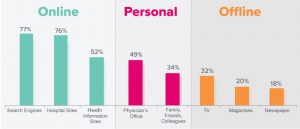Bariatric Medical Practice Marketing Rule #2: Make It Easy for Patients to Find You

We kicked off this blog series with a discussion the first rule for growing your bariatric medical practice: the importance of “knowing your numbers.” This time, we will explore our next rule: make it easy for your patients to find you and begin their journey.
Let’s begin with understanding how and where patients are finding healthcare services. It should come as no surprise that patients use online searches more than anything else—which includes personal referrals from physicians, family, friends and colleagues, as well as offline influencers like TV, magazines and newspapers.

We know this from a well-known Google study1 published this a few years ago that also showed how:
• More than 85% of patients began their searches online for health-related topics
• 48% of patients took more than two weeks to research before booking appointments
• 61% visited two or more hospitals sites before “converting” (more on this in a moment)
Find Yourself: Are You Experienced?
When we’ve asked bariatric healthcare marketers if they’ve ever tried to find their own hospital or clinic online—the same experience a potential patient would have—the answer is often no.
We are driving home an important point, not pointing fingers: If it’s not easy to find yourself online, imagine what it must be like for patients that aren’t even aware of you, especially in competitive markets!
With so much at stake with patients being able to find your bariatric medical practice online, the importance of online search strategies, healthcare advertising and tools become increasingly obvious—and even more when you learn that:
• Searches drive nearly three times as many visitors to hospital sites compared to non-search visitors
• Organic search results are more than 80% more likely to be clicked on than paid search results
The ABCs of Bariatric Marketing with SEO, SEM and PPC
Great SEO (search engine optimization) is the key to getting your share of organic search traffic to your bariatric surgery center’s Website, but it can take time to develop a solid SEO strategy and to see the results.
That’s why we should not be too quick to downplay healthcare digital marketing and the amazing potential of paid searches, also known as PPC (pay-per-click) and SEM (search engine marketing). With the right combination of creatives (ads), keyword selection and bidding, patients will take action. According to Google, it’s meant:
• 28% visiting the advertised hospital’s Website
• 21% considering the advertised hospital
• 5% contacting the advertised hospital
Conversions: Are You Turning Prospects Into Bariatric Surgery Patients?
No matter how much search traffic comes to your bariatric hospital’s Website, it doesn’t mean anything unless you have great “conversion rates,” another way to say: Are you turning prospects into patients after they’ve found you?
This leads to two immediate questions:
• What is your current conversion rate?
• How can you increase your conversion rate?
If you are finding that your conversion rates aren’t meeting your expectations, you will want to again return to the earlier question about trying to experience what it’s like to search for your facility. This time, try to understand the experience of your Website. How would you answer the following questions:
• Is your Website appealing to prospective patients?
• Is your Website optimized for both mobile and desktop?
• Is it easy for patients to find the right information?
• Is there a clear call-to-action (CTA) on the Website to help patients get started?
• Do you offer seminars—and if so, what type and how often?
Don’t assume low conversion rates are entirely the fault of the Website, though. This is especially true if you are noticing a sharp decrease in rates between Website registrations and seminar completion. In this case, consider these enhancements:
• Automated reminders prior to seminar
• Personal phone call prior to seminar
• Offer more seminar times or online options like Webinars
We’ll close on that note, but when we resume, we’ll talk more about increasing intake rates after seminars and Webinars.
As Sequence Health’s Central/Western Regional Director, Chris Stearns regularly engages with bariatric medical practices to find solutions that help grow their revenues and profitability.
Sequence Health is a cloud-based technology and services company that improves profitability and patient outcomes for hospitals and practices through end-to-end patient engagement solutions backed by clinical and non-clinical teams. Its HIPAA-compliant, SaaS platform improves care team workflows, automates patient communication and tracks patient progress to optimize the patient journey. Since 2004, leading healthcare providers have trusted Sequence Health to help acquire, manage and engage patients through complex episodes of care.





